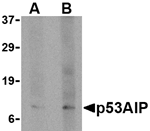The p53 tumor-suppressor protein can induce apoptosis through transcriptional activation of several genes. One such protein p53AIP was initially identified through direct cloning of p53 binding sequences from human genomic DNA. Its expression is inducible by p53 following p53 phosphorylation on Ser-46, and ectopic expression of p53AIP leads to apoptotic cell death. Both the phosphorylation of p53 and the induction of p53AIP were blocked by inhibiting the expression of p53DINP1 by the introduction of antisense oligonucleotides to p53DINP1, suggesting that the apoptosis associated with p53AIP expression is regulated by p53DINP1. Finally, as adenovirus-mediated introduction of p53AIP has been shown to suppress tumor growth in vivo, it has been suggested that p53AIP gene transfer may become a useful strategy for the treatment of p53-resistant cancers. Three isoforms of p53AIP are known to exist; this antibody will detect all three.


